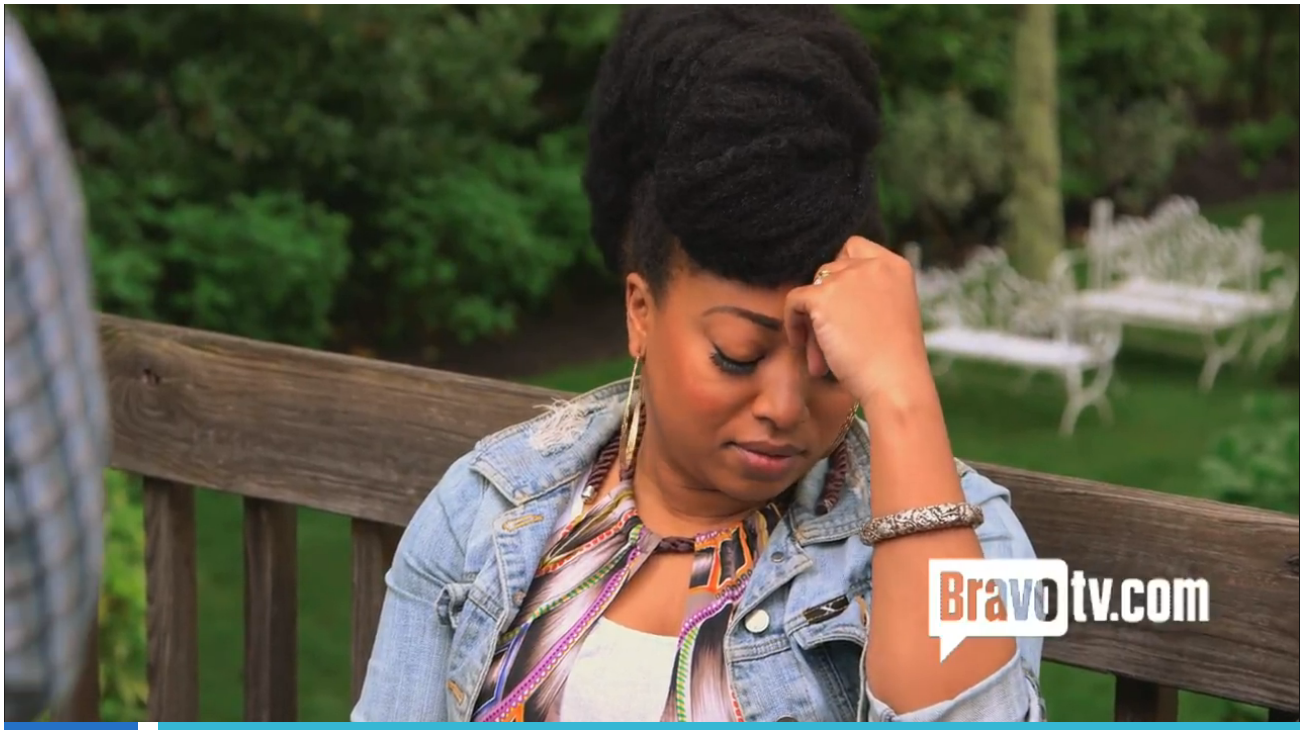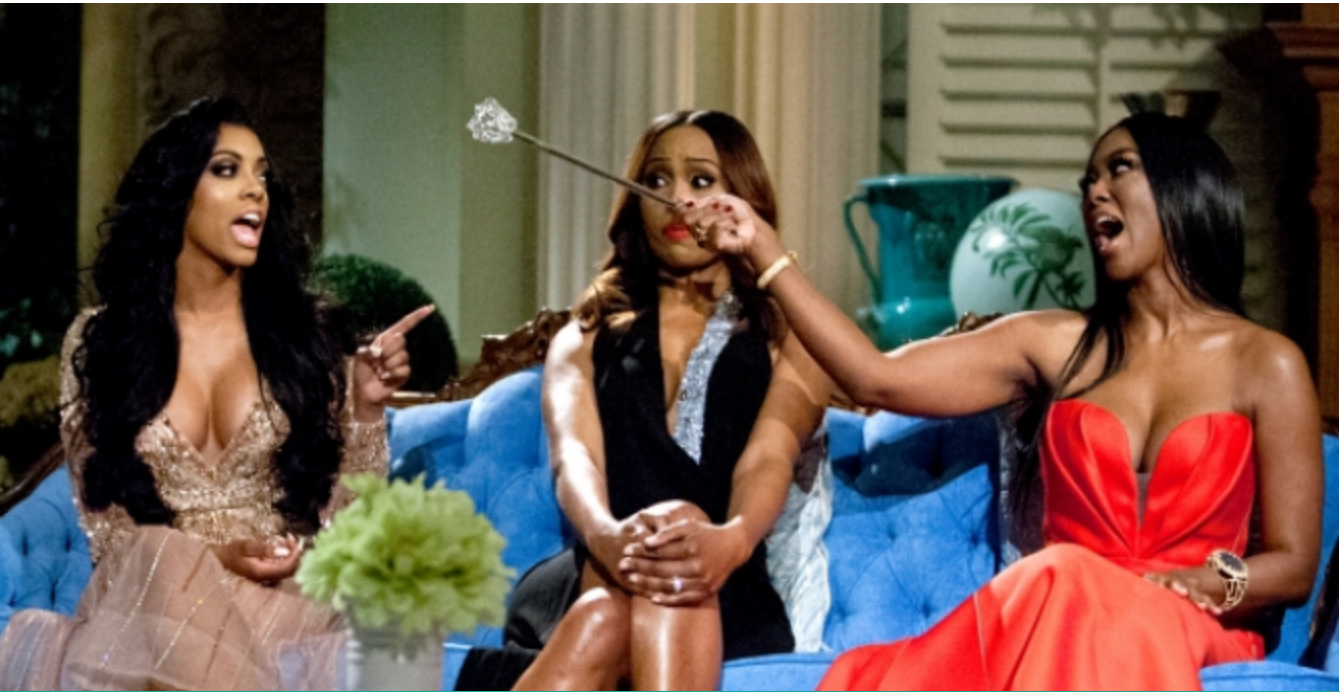 I don’t like watching reality TV shows, especially the programs that have a penchant for making Black folks look corny as hell. It’s not that I think I’m better than anyone who does enjoy these shows (like my sister, who says these programs help her de-stress after long days of school as she attains her master’s degree), but I just find the bickering and bullshit annoying (hell, I can get that in my own life). So when I heard that Bravo was releasing a new show called “Blood, Sweat and Heels“, I instantly rolled my eyes and attempted to change the channel as fast as I could – until someone very familiar popped up on my screen: Demetria Lucas.
I don’t like watching reality TV shows, especially the programs that have a penchant for making Black folks look corny as hell. It’s not that I think I’m better than anyone who does enjoy these shows (like my sister, who says these programs help her de-stress after long days of school as she attains her master’s degree), but I just find the bickering and bullshit annoying (hell, I can get that in my own life). So when I heard that Bravo was releasing a new show called “Blood, Sweat and Heels“, I instantly rolled my eyes and attempted to change the channel as fast as I could – until someone very familiar popped up on my screen: Demetria Lucas.
I know Demetria through her strong writing as an advocate for the empowerment of Black women and an opinionated critic of relationships and everything that comes along with them. The reason I couldn’t change the channel was because I couldn’t wrap my mind around the fact that Demetria, a harsh critic of reality TV and its presentations of Black women, was doing on a show that, from the trailer, appeared to be everything she once denounced.
After watching the first episode, I realized something very significant about Demetria Lucas – of all the women on the show, she is not only the best at branding her business, but she is also (intentionally or unintentionally) positioning herself as an “anti-reality TV, reality TV star”. So getting the opportunity to sit down and talk with her was intriguing.
Lincoln Anthony Blades: The big question I have, as someone who writes and blogs, is how did this opportunity come up? And what did you think about it when it was first presented to you?
Demetria Lucas: Oh, my first thought was hell no. I’ve been approached to do reality shows several times, and someone reached out to my manager and said “we’d like for Demetria to consider it” and when she called me I was like “no, no, no this is not gonna happen. I’m not doing reality TV.” If you follow my work I’ve been very critical of the portrayal of Black women on television, and [my manager] was like “I think this is different, give it a shot” and I trust her, so I said ‘OK, let me see, I’ll hear them out.” So I met with the production team, I met some of the other ladies on the show, and I liked that they all had good backgrounds and I thought maybe this would be different because the women here have something to lose. We’re not here to be famous, we’re not independently wealthy, we have to work for a living, so our reputations matter. So I think this might be something different and I think this might be a good opportunity. It took me a minute to sign on, but I eventually came around.
LAB: So, just to go off what you were saying before, there’s been a lot of campaigns like Michaela Angela Davis’ “Bury The Ratchet” campaign where she’s gone after everything from Love & Hip-Hop to Married to Medicine to the Real Housewives of Atlanta. If someone was to say that your show is like these other shows or asked you to prove your show is different, how would you explain that “Blood, Sweat & Heels” should not be considered ratchet?
DL: Well, I can say that there is no fighting, no bottle throwing, no over-the-top physical antics. I think you saw there is some psychological stuff, you know I got ambushed at a dinner table which I definitely didn’t appreciate. But you know what? Michaela has been a friend and mentor of mine for years. She is someone that I ran this by and she let me know very clearly what her expectations were of me. She’s known me for a while and she said “You know what I expect”. I hope, in that sense, that I gave it to her. But I do think the show tackles some deeper issues that working women deal with like, can a woman lead? How do you balance a career and a relationship? It gets tricky sometimes, but I think those conversations aren’t being had on Housewives. These women are married, most of them are in stable relationships and you don’t get the nitty gritty of that. We are all women who’ve sacrificed a lot of our personal lives in order to pursue our careers. And I think there’s always the question hanging over us of, was it worth it? Does it all balance out at the end? Do we get to have it all? So I think in that sense we are a little different than the other shows you see on television.
LAB: Recently, a lot of people have been saying that this is a great time for Black women in television because of Sasheer Zamata being hired on SNL with two other black writers, and shows like Being Mary Jane and Scandal, which have won awards. Do you think that your show contributes to what is a pretty good time for Black women in television?
DL: Absolutely. You know, for so long there’s been a conversation about Black women. There’ve been these studies and conversations on Nightline, The Washington Post and The New Yorkerand Psychology Today. Everyone was talking about Black women but this is the first time you’re really seeing Black women control their own narrative. In terms of Being Mary Jane, Mara Brock Akil is at the helm of that. Shonda Rhimes is at the helm of Scandal. For our show, we’re in control of what comes out of our mouths and how we behave.
After the interview was over and I watched more of Blood, Sweat and Heels, its become even clearer that Demetria doesn’t fall into any typical Black reality TV caricature. She’s not a kept woman, or an anti-intellectual who thinks the underground railroad was an actual train. She’s not the backstreet brawler or the hood-chick playing bougie. It really seems like she’s essentially the voice of people with common sense who watch these shows shaking their head in disgust. In my opinion, Blood, Sweat and Heels (with this current cast) won’t do much to empower Black women or change the perception of professional African-American women in New York, but it may just be the platform to something bigger and better, kinda like the early ratchet Oprah years that preceded the far classier “Book Club” days.
Well, at least one can hope.
Read the complete article here


